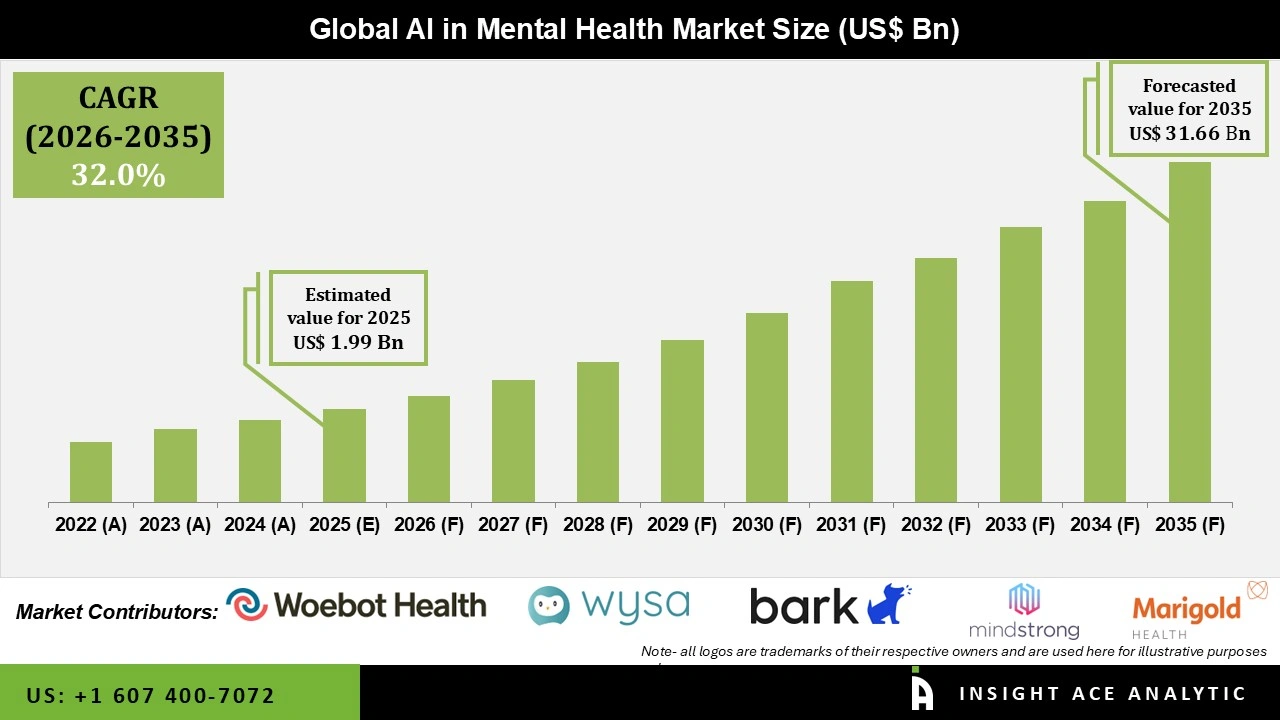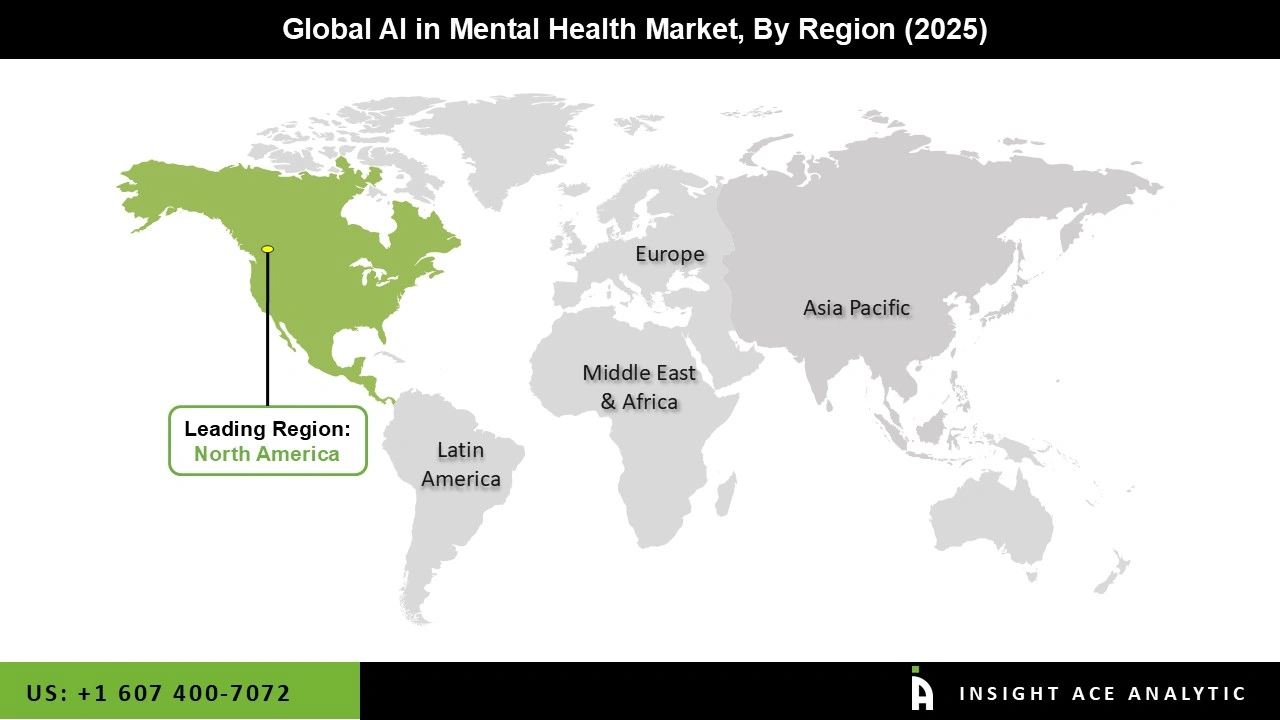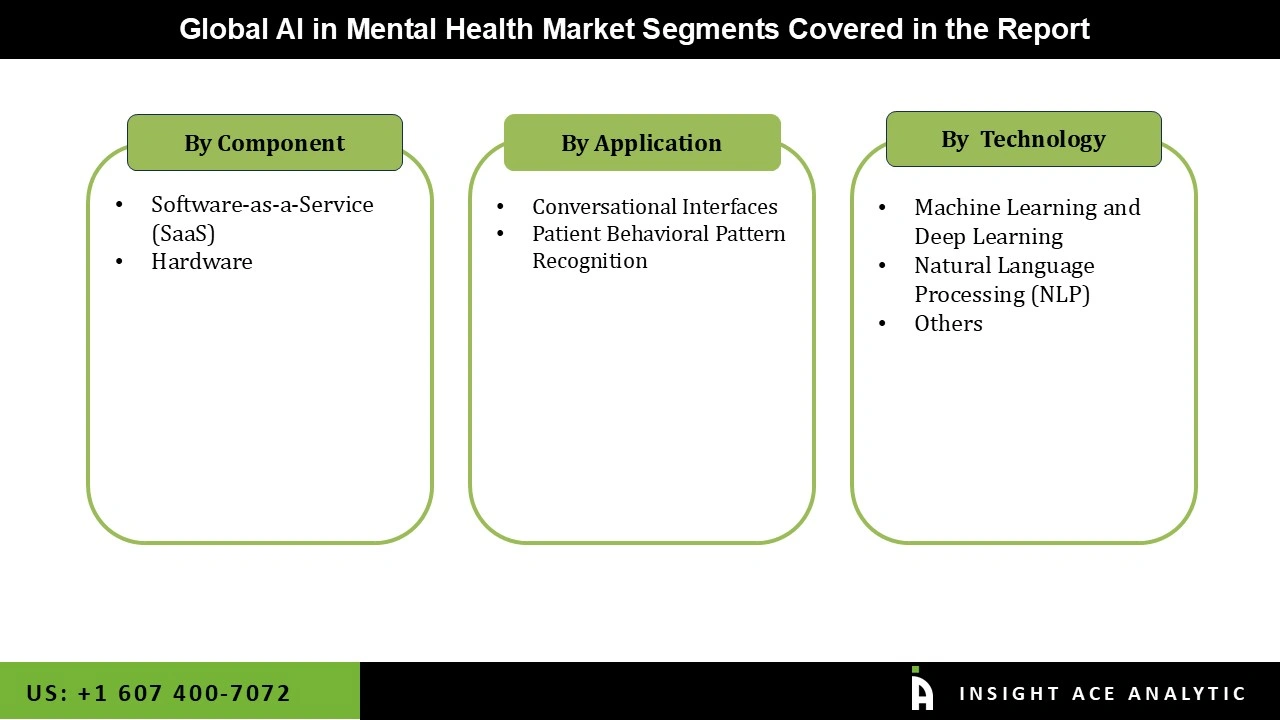Global AI In Mental Health Market is valued at US$ 1.99 Billion in 2025, and it is expected to reach US$ 31.66 Billion by 2035, with a CAGR of 32.0% during a forecast period of 2026 to 2034.
AI in Mental Health Market Size, Share & Trends Analysis Report By Application (Conversational Interfaces, Patient Behavioral Pattern Recognition), By Technology (Machine Learning, Deep Learning, Natural Language Processing (NLP), and Others), By Component, By Region, And By Segment Forecasts, 2026 to 2035

Many AI activities are underway in the healthcare industry, some of which are geared at enhancing mental health and well-being. These AI projects aimed at improving mental health and well-being worldwide are likely to be the market's primary driving force. AI in the healthcare market has historically been showcasing significant growth owing to the rapid adoption of ML and AI software in the healthcare sector. The emergence of the COVID-19 pandemic provided a chance to demonstrate the power and sophistication that AI can bring to the healthcare sector. During the second pandemic wave, hospitals and clinics around the world used AI-based virtual assistants, inpatient care bots, and AI-assisted surgery robots to deal with the constant influx of patients, which would otherwise have overrun the entire hospital operation cycle. The increasing size and complexity of datasets driving the need for AI, rising demand to reduce rising healthcare costs, and increasing imbalance between the health workforce and patients driving the need for improved healthcare services are the major market drivers.
Several healthcare practitioners are skeptical of AI solutions' ability to diagnose medical problems effectively. Given this, convincing providers that AI-based solutions are cost-effective, efficient, and safe solutions that bring convenience to doctors and better care for patients is difficult. On the other hand, healthcare providers are increasingly accepting of the potential benefits of AI-based solutions and the range of applications they serve.
The AI in Mental Health market is segmented on the basis of application, technology and component. Based on application, the market is segmented into Conversational Interfaces and Patient Behavioral Pattern Recognition. The technology segment includes Machine Learning, Deep Learning, Natural Language Processing (NLP), and Others. By component, the market is segmented into Software-as-a-Service (SaaS) and Hardware.
The Software-as-a-Service (SaaS) segment is expected to account for the majority of the artificial intelligence in the healthcare market. Many organizations are developing software solutions for various healthcare applications, which is a crucial factor contributing to the Software-as-a-Service (SaaS) segment's growth. Strong demand among Software-as-a-Service (SaaS) developers (particularly at medical institutions and universities) and expanding AI applications in the healthcare industry are among the primary factors driving the AI platform's growth in the Software-as-a-Service (SaaS) market. Some of the best AI platforms are Google AI Platform, TensorFlow, Microsoft Azure, Premonition, Watson Studio, Lumiata, and Infrrd.
Machine learning (ML) and deep learning are expected to gain the most significant proportion because ML, a commonly used type of AI, is one of the most rapidly growing sectors in technology. Machine learning is contributing to the transformation of mental health in two ways: crisis prediction and the formulation of treatment plans/identification of biomarkers. By studying critical behavioural biomarkers, machine learning algorithms can assist mental health doctors in determining whether a patient is at risk of developing any mental health illness. Furthermore, the algorithms may aid in monitoring a treatment plan's efficacy.
The North America region is expected to hold the largest share of artificial intelligence in the mental health market over the forecast period. The primary factors driving the growth of the North American market are the increasing adoption of AI technology across the continuum of care, particularly in the United States, and high healthcare spending combined with the onset of the COVID-19, which has accelerated the adoption of AI in clinics and hospitals across the region.

Asia-Pacific, on the other hand, is expected to expand quickly during the projection period due to increased investment in AI across Asian countries. One of the important reasons driving the market is the expansion of global market participants in Asian markets such as China, India, and others. Furthermore, significant IT infrastructure innovation and development, as well as entrepreneurial firms focusing on AI-based solutions, are generating revenue in this region.
| Report Attribute | Specifications |
| Market Size Value In 2025 | US$ 1.99 Billion |
| Revenue Forecast In 2035 | US$ 31.66 Billion |
| Growth Rate CAGR | CAGR of 32.0% from 2026 to 2035 |
| Quantitative Units | Representation of revenue in US$ Billion and CAGR from 2026 to 2035 |
| Historic Year | 2022 to 2025 |
| Forecast Year | 2026-2035 |
| Report Coverage | The forecast of revenue, the position of the company, the competitive market structure, growth prospects, and trends |
| Segments Covered | By Application, By Technology, By Component |
| Regional Scope | North America; Europe; Asia Pacific; Latin America; Middle East & Africa |
| Country Scope | U.S.; Canada; U.K.; Germany; China; India; Japan; Brazil; Mexico; France; Italy; Spain; South East Asia; South Korea |
| Competitive Landscape | Marigold Health, Mindstrong Health, Bark Technologies, Wysa Ltd, Woebot Health, Ginger, BioBeats, Cognoa, Lyra Health, MeQuilibrium, Meru, New life solution Inc., Quartet, Spring Care Inc., Talkspace Inc. and Others |
| Customization Scope | Free customization report with the procurement of the report and modifications to the regional and segment scope. Particular Geographic competitive landscape. |
| Pricing And Available Payment Methods | Explore pricing alternatives that are customized to your particular study requirements. |

This study employed a multi-step, mixed-method research approach that integrates:
This approach ensures a balanced and validated understanding of both macro- and micro-level market factors influencing the market.
Secondary research for this study involved the collection, review, and analysis of publicly available and paid data sources to build the initial fact base, understand historical market behaviour, identify data gaps, and refine the hypotheses for primary research.
Secondary data for the market study was gathered from multiple credible sources, including:
These sources were used to compile historical data, market volumes/prices, industry trends, technological developments, and competitive insights.

Primary research was conducted to validate secondary data, understand real-time market dynamics, capture price points and adoption trends, and verify the assumptions used in the market modelling.
Primary interviews for this study involved:
Interviews were conducted via:
Primary insights were incorporated into demand modelling, pricing analysis, technology evaluation, and market share estimation.
All collected data were processed and normalized to ensure consistency and comparability across regions and time frames.
The data validation process included:
This ensured that the dataset used for modelling was clean, robust, and reliable.
The bottom-up approach involved aggregating segment-level data, such as:
This method was primarily used when detailed micro-level market data were available.

The top-down approach used macro-level indicators:
This approach was used for segments where granular data were limited or inconsistent.
To ensure accuracy, a triangulated hybrid model was used. This included:
This multi-angle validation yielded the final market size.
Market forecasts were developed using a combination of time-series modelling, adoption curve analysis, and driver-based forecasting tools.
Given inherent uncertainties, three scenarios were constructed:
Sensitivity testing was conducted on key variables, including pricing, demand elasticity, and regional adoption.